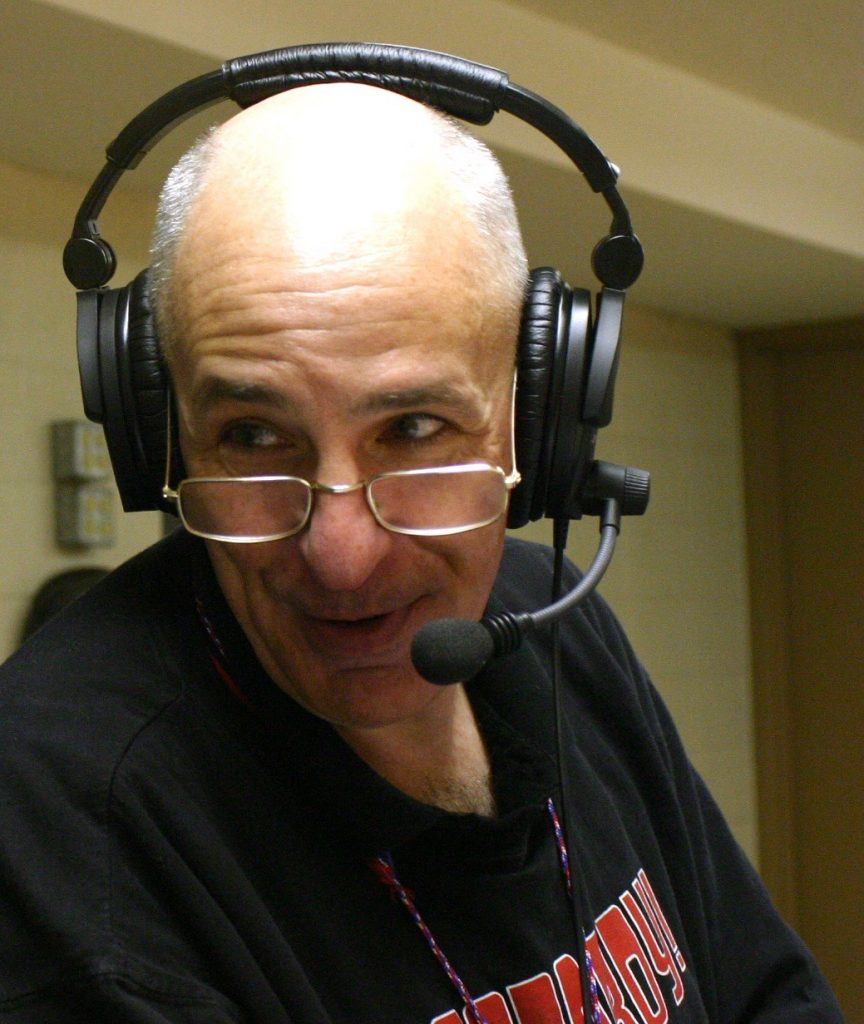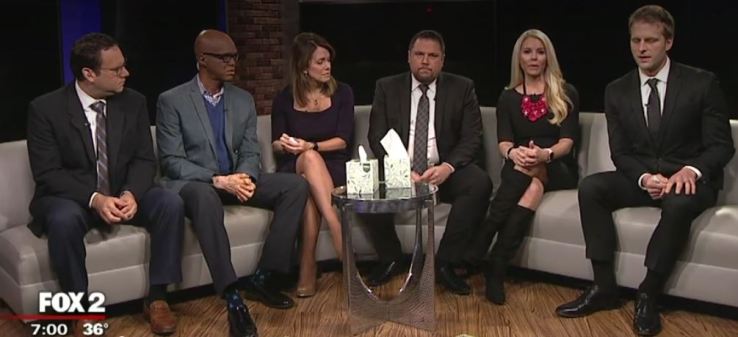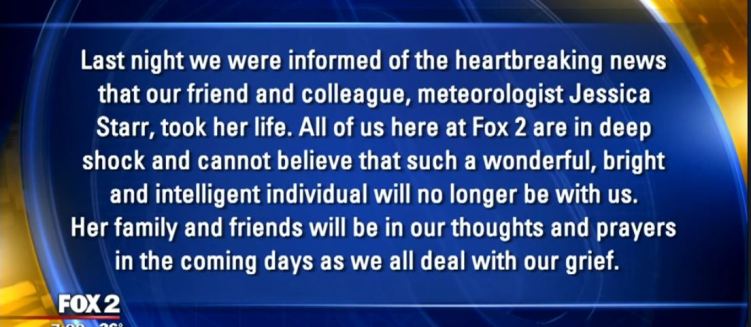
This has been one of those average mid-December days in West Tennessee. Sure, Christmas is on the way and many are in a festive mood. Finals Week is over for me at Union University and my students and I shout a collective “Hallelujah.” The weather has been mostly overcast.
Yet, at 3:30 this afternoon, a friend from WJXT in Jacksonville Fla. — Ashley Harding— sent a Facebook post asking for prayer for a young woman in Detroit. The young woman is one we will not see again on television — or elsewhere.

Jessica Starr was the morning meteorologist at Fox 2 in Detroit.
Jessica Starr was the morning meteorologist on Fox 2 in Detroit. She was part of one of those typical early show ensembles that gives the impression they are family. In most cases, they are.
Only one member of that television family is gone. Not because she’s going to a job in New York, Los Angeles or one of the networks.
Jessica Starr took her own life. She was 35.
In most instances, barring a note left behind, what leads one to a decision of suicide remains a mystery. Jessica had a husband and children. By all accounts, she had a lively personality and was well-liked by those with whom she interacted in remote segments. From the comments of her visibly-shaken colleagues, this morning was a struggle for all of them to process their grief.

The morning show family at WJBK-TV in Detroit went on the air this week and discussed the tragic death of their friend Jessica Starr.
http://www.fox2detroit.com/about-us/378383644-video
I had never seen or heard of Jessica before reading the story of her death. That immediately took me back to three friends in media whom I lost to suicide.
The first was a man I did not know long. John Patterson had only been in Columbus Ga. a few months in 1980. He was the lead anchor and reporter for WRCG, a popular AM news/talk station. During breaks in Columbus Council meetings or before a mayor’s news conference, John and I engaged in conversations that were refreshing. We talked occasionally about news but more about personal interests. I learned he had an interest in classic TV similar to mine.
On a Thursday morning, just one day after a contentious news conference, John was rolled out of his apartment complex on a gurney with a cover over his body. Colleagues struggled to find a clue as to why John made that fatal decision. My close friend Richard Hyatt, an award-winning columnist for years with The Columbus Ledger-Enquirer, wrote a piece the day after John’s death that followed the theme “we never know.”
In the summer of 1986, I picked up The Columbus Enquirer before work and nearly dropped it to the floor. The obituary page detailed the death of Jack Kendrick. Jack’s father was a well-known retired band director in Columbus. Jack was one of the most thorough reporters I ever personally knew. He was also my co-anchor on TV3 Sunday Evening News on WRBL in Columbus during my first year in television news.
During that year, we never had one argument. Jack had a great sense of humor. He also had a great career path that I thought might end at a network. He went from Columbus to WKRG in Mobile, then to WFAA in Dallas. Texas is where some personal demons led Jack to rig his car to emit carbon monoxide fumes.
Jack chose to leave this world of his own choosing. Two of my other former WRBL colleagues, David Eisen and Dave Stanton, talked on the phone that morning. We could not come up with any answers.
Several years later, a man who was one of the most incisive newspaper columnists ever in Columbus did what virtually none of us who knew him could fathom. I remember Jack Swift delivering one of the gutsiest pieces of investigative reporting I ever read.
Using disguises and often sneaking into Fort Benning after dark, Jack did scores of interviews with active duty soldiers about intense training practices implemented by the commanding general. Suicides among the troops were mounting. Ultimately, that general was, as the Army would put it, reassigned.
More than 10 years later, as executive editor of the newspaper, Swift championed a public journalism project called Columbus Beyond 2000, which was designed to motivate a community that had stagnated. A story in American Journalism Review details the toll that campaign took on Jack:
http://ajrarchive.org/article.asp?id=1653
November 15, 1990 was a fateful day around Columbus. Jack Swift, one of the most fearless journalists I ever knew, put a gun to his forehead in the living room of his home. Twenty-eight years later, people still wonder why.

I have no idea what caused Jessica Starr, a guest in television viewers’ homes every morning, to take her own life. Probably in her newsroom, amidst their grief, friends and colleagues are pondering the question. Any suggestions they have are likely pure speculation.
That is the frustration. When you lose someone you know or work with in virtually any profession, you look inwardly and in retrospective for that one clue and you ask what could I have done to have kept a fatal moment from happening? In virtually every instance, the answer is nothing. Still, we as
(National Suicide Prevention Lifeline — (800) 273-8255)
I have offered to go to any newsroom in America to lead a seminar on the impact of depression, anxiety and other mental illness and the warning signs for anyone in the deadline-driven, high-stress world of media. Perhaps one day, one news director will take me up on it. Could that kind of engagement have saved Jessica Starr? Maybe, maybe not. As Richard Hyatt wrote nearly 40 years ago, we’ll never know.
If an hour or two of amateur therapy from The Old TV News coach could help a media practitioner from the same fate as Jessica, I’m as close as a phone call, an email, or a text message.
Whether you are in media or any other walk of life, if you feel the warning signs of depression that may include suicidal thoughts, help is available. Call the National Suicide Prevention Lifeline toll-free at (800) 273-8255. Counselors are there 24/7. As I have said to many groups, you can’t get well if you don’t get help.
May God bless Jessica’s family and the staff of Fox 2 WJBK in their time of loss.


Chattooga Local News
Oversight Committee Releases Bill and Hillary Clinton Deposition Videos

Chattooga Local Government
Fallen Heroes: Four Army Reserve Soldiers Die in Kuwait Drone Strike

Bulloch Public Safety
03/03/2026 Booking Report for Bulloch County

Bulloch Public Safety
02/09/2026 Booking Report for Bulloch County

Bulloch Public Safety
02/16/2026 Booking Report for Bulloch County

Bulloch Public Safety
02/20/2026 Booking Report for Bulloch County

Bulloch Public Safety
02/17/2026 Booking Report for Bulloch County

Bulloch Public Safety
03/02/2026 Booking Report for Bulloch County






